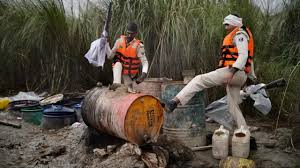
BBC:
Nine years after imposing a statewide alcohol ban to curb addiction, domestic violence, and financial ruin among its poorest families, Bihar – India’s poorest state – still struggles to gauge the policy’s effectiveness.
The gaps in implementation became glaring as the BBC shadowed Bihar officials in a misty October morning raid on bootleggers.
Armed excise officers, with a sniffer dog, sped across the Ganges on a boat to raid an illegal distillery.
On reaching the outskirts of the capital, Patna, the team found a ramshackle setup of a dozen metal drums – part of a makeshift apparatus fermenting jaggery, a type of cane sugar, into country liquor.
Vapour rose from the drums embedded in the riverside mud, the surfaces still warm.
The officers said the site was active minutes earlier, but the alcohol-makers had fled by the time they arrived.
“They often get tipped off before a raid,” an officer who didn’t wish to be named said.
Despite these enforcement gaps, alcohol prohibition remains firmly in place in Bihar.
Passed in 2016 by Chief Minister Nitish Kumar after persistent demands from women’s groups, the law was among the factors that helped his Janata Dal (United) – Bharatiya Janata Party (BJP) alliance clinch a decisive state election victory earlier this month.
State officials tout the policy’s success by pointing to big numbers: since the law took effect, 1.1 million cases have been registered and 650,000 people convicted for violations. But the devil lies in the detail.
More than 99% of these convictions are for consumption, rather than production, selling, or transport of illicit liquor. Moreover, alcohol remains widely available in the black market in Bihar.
In the six weeks leading to the recently held election, illicit alcohol worth more than 522 million rupees ($6.26 million, £4.96 million) was seized from across the state.








 Users Today : 2046
Users Today : 2046 Users Yesterday : 2754
Users Yesterday : 2754 This Month : 41544
This Month : 41544 This Year : 205228
This Year : 205228 Total Users : 563205
Total Users : 563205 Views Today : 4436
Views Today : 4436 Total views : 1770326
Total views : 1770326 Who's Online : 7
Who's Online : 7